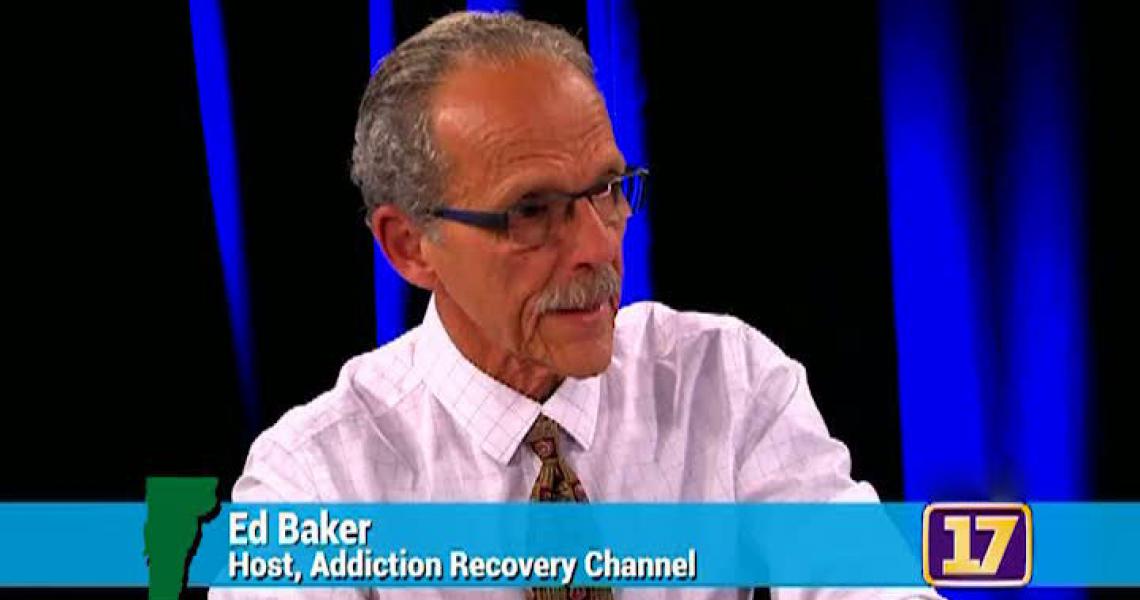Addiction Recovery Channel Tunes in to Help and Hope

Thirty-Five years in recovery fuels inspiration for retired social worker Ed Baker’s local talk show on CCTV.
Every month, when Ed Baker sits across from a guest on the Addiction Recovery Channel (ARC), he has another chance to chip away at misconceptions and stigma regarding substance use disorder and those who struggle with it.
Stigma creates the biggest barrier to recovery, Baker says, and banishing it is the key to helping people beat back the brain disease of addiction that has consumed too many. That’s what Baker, a retired social worker with 35 years in long-term recovery, hopes to accomplish as the founder and host of the ARC, which airs monthly on the CCTV Center for Media and Democracy’s public access network, Channel 17.
“The goal of the show is actually to contribute to the creation of an environment, a social and cultural environment, that is sensitive and supportive to people with addiction and their need to receive quality treatment and adequate support services over their life span,” Baker says. “There are people out there languishing in the shadows with addiction who will not come forward because of stigma.”
Baker launched the ARC in September 2017 and celebrates the start of his third year during Recovery Month with the airing of his 24th show. The ARC has gained a loyal following, particularly among people in recovery or those who live or work with people with substance use disorder.
“He’s a great moderator, asks great questions,” says Gary De Carolis, a recurring ARC guest and executive director of the Turning Point Center of Chittenden County, a community space for people in recovery. “He speaks from both the heart and the head.”
Baker chooses his guests carefully and does extensive homework before taping interviews. His past roster includes dignitaries such as Burlington Mayor Miro Weinberger and Vermont Attorney General T.J. Donovan and Mark Levine, MD, commissioner of Vermont Department of Health, in addition to experts in the trenches. For too long, Baker says, the public has hungered for accurate information from those in the know.
“Our task now is educating the public about the nature of this disease and the fact that recovery is possible … if people are provided with the proper medical, proper psychotherapeutic, proper recovery support services over time,” he says. “This is America’s task. This is Vermont’s task.”
Baker, 72, offers deep compassion for those suffering from addiction and equal passion for conveying their experience. Much of the public only sees people with substance use disorder in an unsavory, unhealthy or unattractive state, he says. Many lack understanding that addiction causes changes in the brain that, coupled with genetic and environmental factors, hijack a person’s body and behavior.
“Addiction is by no means a choice,” Baker explains. “It’s a disease.”
Baker’s expertise in addiction and recovery isn’t just professional, it’s personal. At age 13, in response to trauma he suffered as a child in the Bronx, N.Y., he began using alcohol, nicotine and marijuana and later injectable drugs, he says.
He tried to quit multiple times, eventually entering a therapeutic community in the Bronx and staying for two years. He counseled other residents there and reached a status that allowed him off-site living, with drinking privileges. It didn’t take long for him to relapse.
But his therapeutic skills stuck. During that time, Baker earned his master’s degree in social work at Fordham University in the Bronx and did a fellowship at Columbia University. He got married and had children but also developed “full-blown alcoholism,” he says.
In 1983, he moved to Morrisville, Vt., a location change that’s sometimes called “a geographical cure” for those trying to escape addiction, “which doesn’t work,” he points out. A year later, he found a 12-step program that helped him begin the never-ending road to recovery. And it cleared the way for his lifelong career in addiction and recovery as an alcohol and drug counselor.
He remains actively involved as a member and sponsor in the program that bolstered him. His first marriage ended in divorce, but he is remarried with four sons and four grandchildren and says his family is the driving force in his life.
No longer in practice as a counselor, his time spent asking questions and listening to those with first-hand experience in addiction and recovery inadvertently prepared Baker for his role as a television host.
A couple of years ago, CCTV host Margaret Harrington asked him to come on her current events show, “Focus,” to talk about addiction and recovery. Afterwards, she and CCTV staff suggested he should front a regular program of his own.
Addiction Recovery Channel is one of the most successful on the network, consistently in the top three of the most-watched shows, says Dan Logan, CCTV producer and Channel 17 coordinator. On CCTV’s media exchange to share programming locally and nationally, the three most recent ARC episodes were downloaded by 53 other channel operators – 19 of them from out of state.
Today, Baker says, Vermont is experiencing a sea change, with a groundswell of compassion for people with substance use disorder and greater recognition of addiction as a disease – a disease that can be successfully treated.
Slowly, stigma is subsiding and opening doors to recovery.
This story was reported by Carolyn Shapiro, with the UVM Health Network.
View episodes of Addiction Recovery Channel:
https://www.cctv.org/watch-tv/series/addiction-recovery-channel
Ed Baker’s website:
https://edbakermsw.com/






